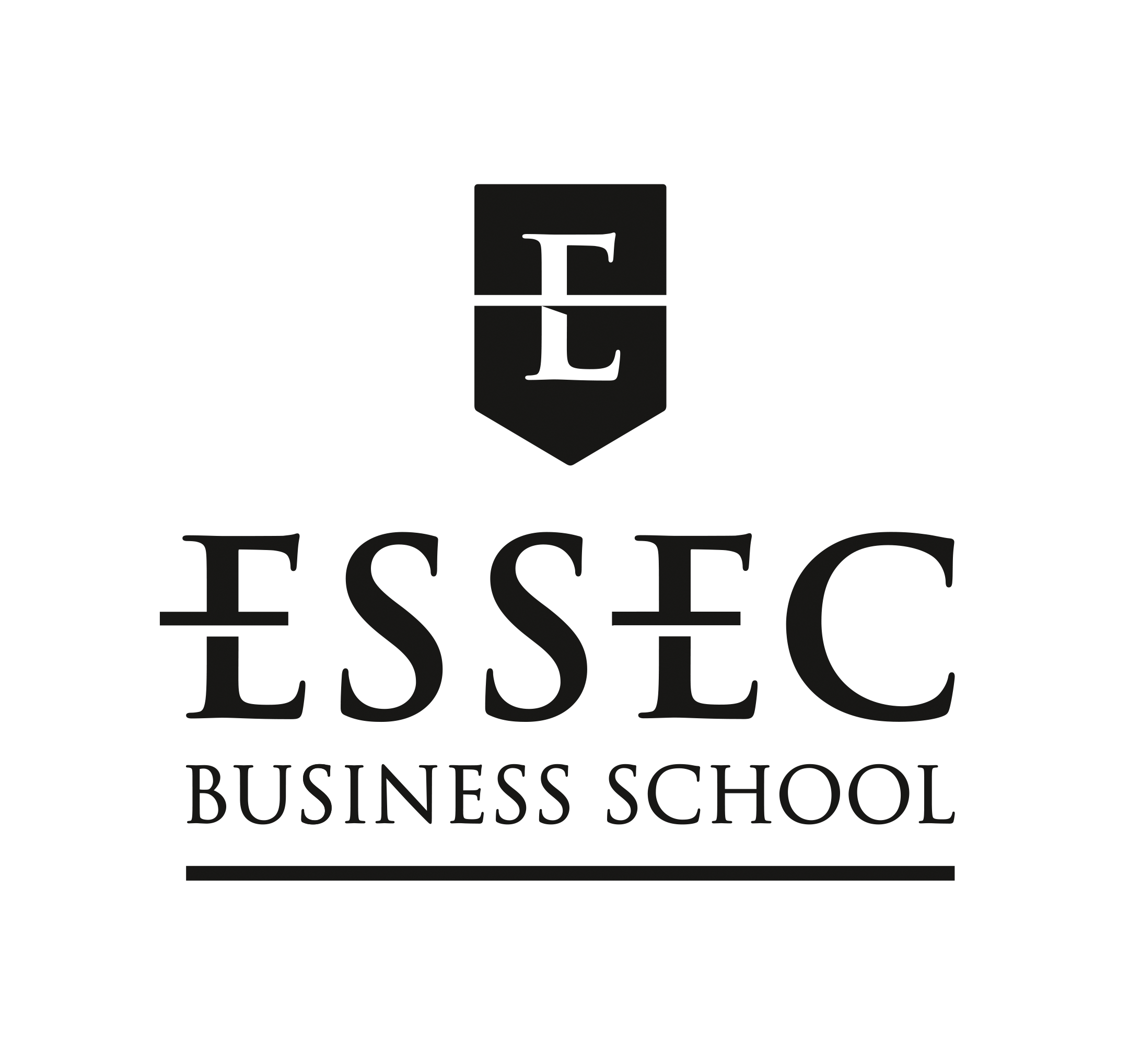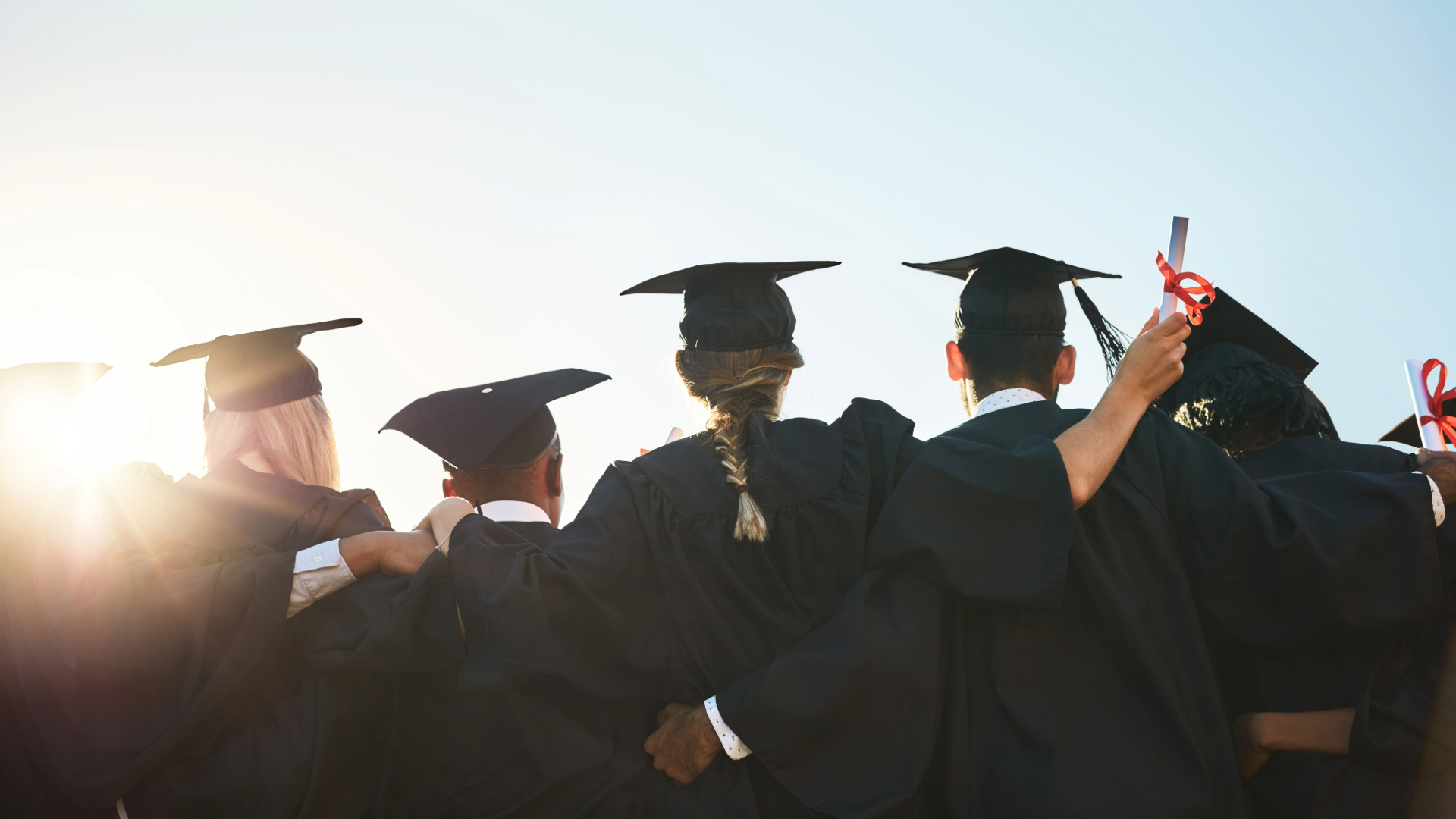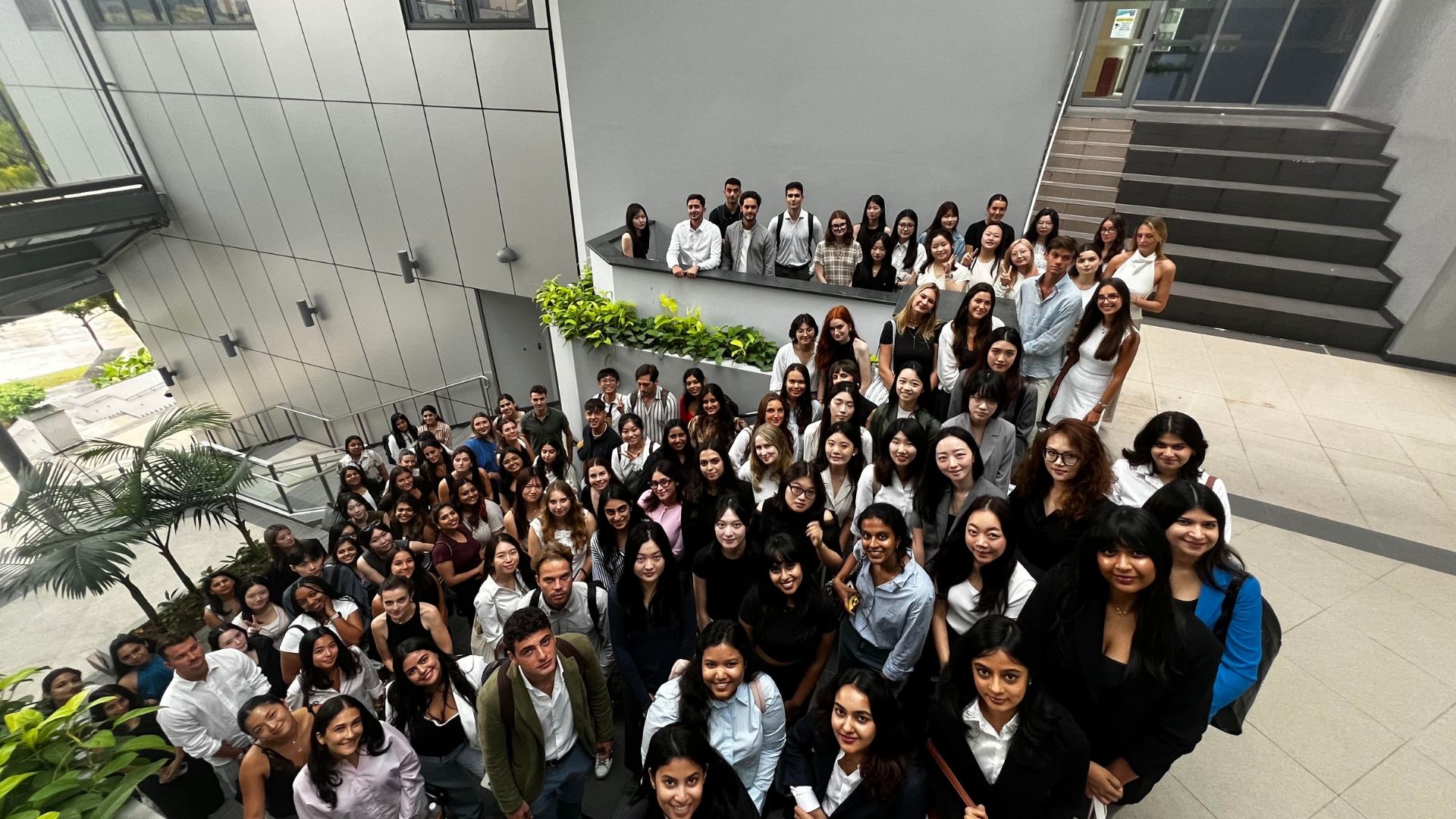Between May 20 and 24, 2024, a hundred Master in Management (MiM) students from the Asia-Pacific campus of ESSEC Business School participated in an enriching study trip to Thailand.
This trip, a core component of the Business Management in Asia Track program, was designed to immerse students in the Southeast Asian market. It offers a unique blend of academic learning and practical exposure.
Over five days, the students visited prominent companies and cultural landmarks, gaining insights into innovative practices, sustainability initiatives, and the operational complexities of a rapidly evolving economy.
Itinerary
Day 1: Wongpanit International and ALBA Group
Day 2: Agoda and Rhenus Logistics
Day 3: Historic city of Ayutthaya
Day 4: EssilorLuxottica and Kärcher
Day 5: WYZauto
Day 1: Sustainability with Wongpanit International and ALBA Group
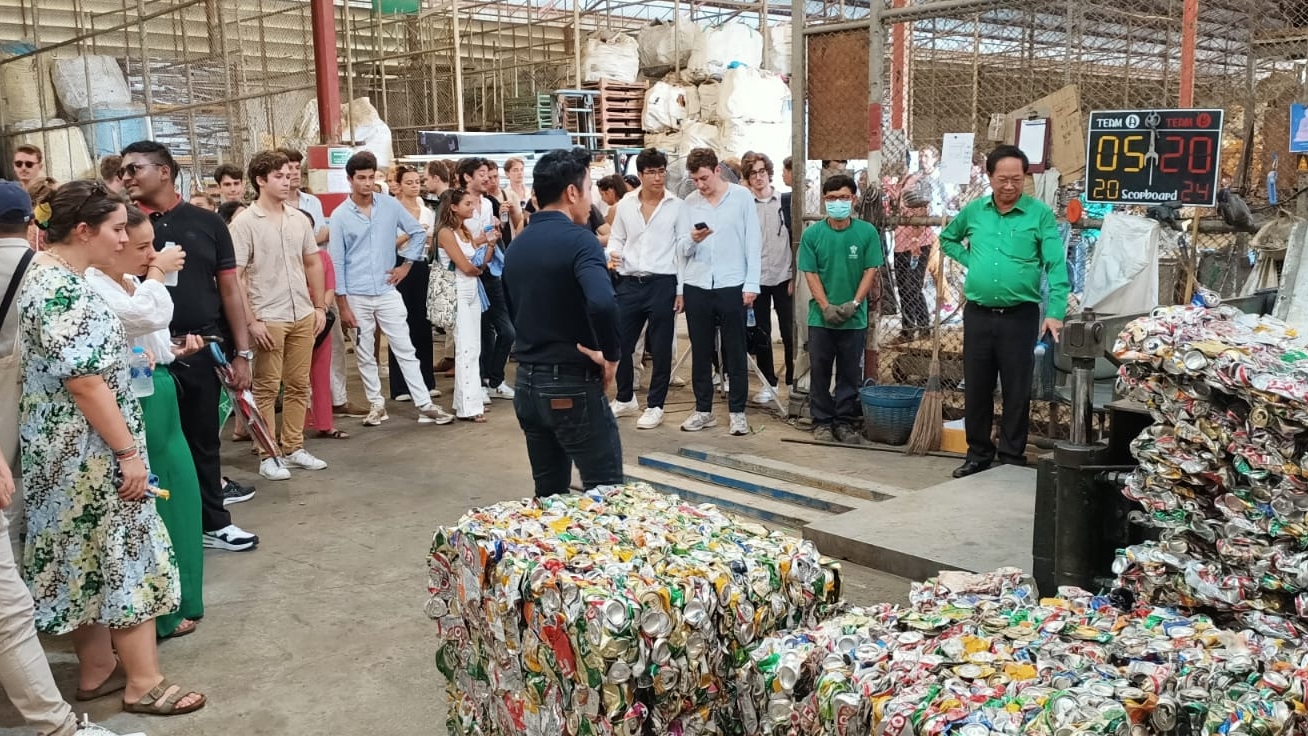
On the first day of the trip, the MiM students visited Wongpanit International, a leading player in the recycling industry known for its commitment to sustainability. Students were given a comprehensive tour of Wongpanit’s facilities, where they observed the company’s innovative recycling processes that significantly contribute to reducing Thailand’s ecological footprint. The visit provided a clear example of how business practices can align with environmental goals, setting the stage for understanding the importance of sustainability in business operations.
A highlight of the day was the session with Wongpanit’s partner, ALBA Group, another major player in the sustainability sector. This collaboration exemplified how strategic partnerships can amplify efforts to tackle environmental challenges on a larger scale. Students learned about the synergies between the two companies, gaining insights into the complexities of implementing sustainable practices in diverse markets and the collaborative approach required to address pressing environmental issues.
The visit concluded with a discussion on the future of sustainability in Thailand, where company leaders shared their visions for expanding sustainable practices nationwide. Students were encouraged to think critically about how businesses can drive positive environmental change. This first-hand exposure to leading sustainability initiatives in Thailand underscored the significance of sustainable business models in achieving long-term success. It inspired students to consider the environmental impact of their future career choices.
Day 2: Explore E-commerce and Logistics with Agoda and Rhenus Logistics
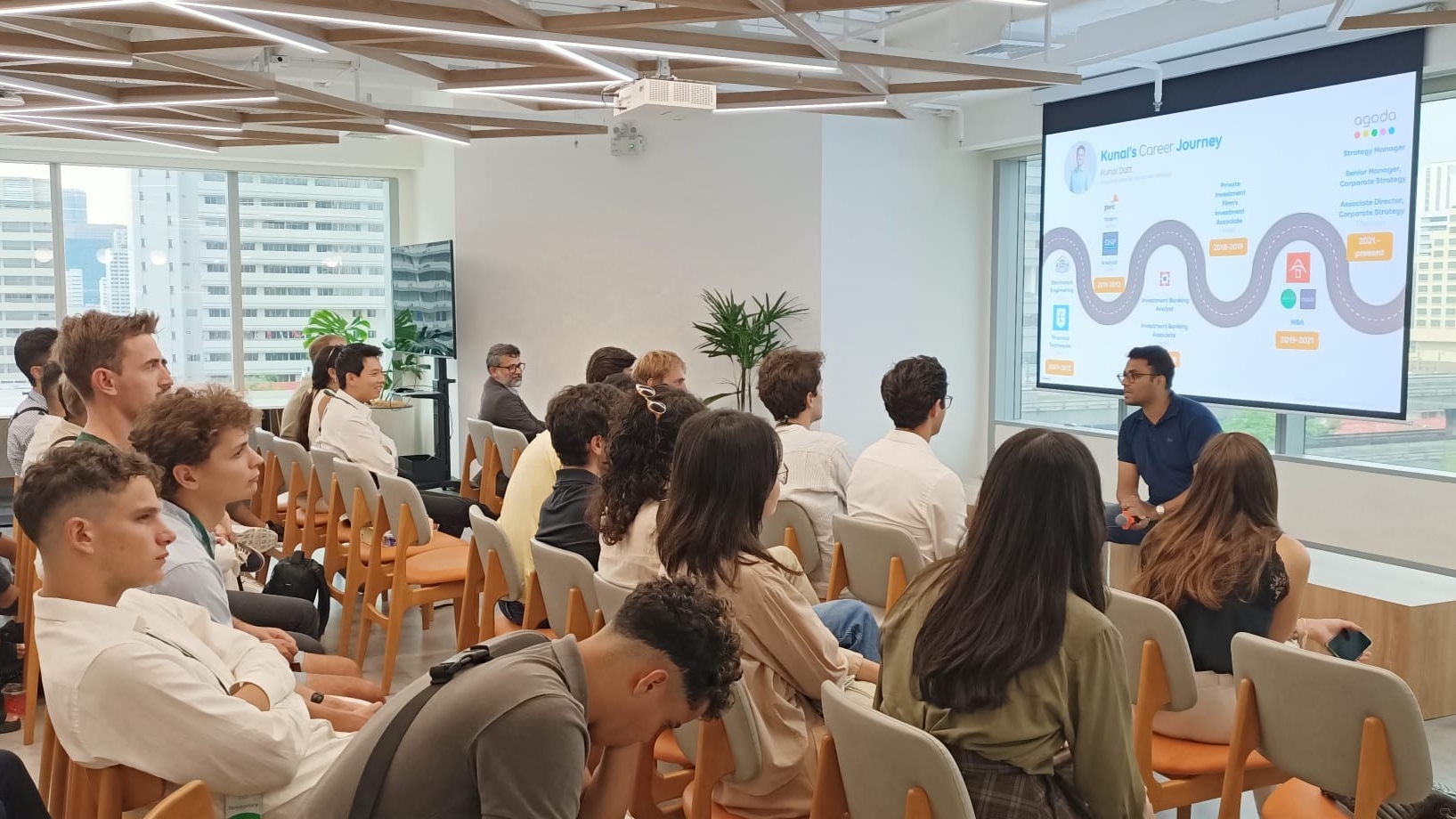
On the second day, the focus shifted to the burgeoning sectors of e-commerce and logistics, starting with a visit to Agoda, a leading online travel agency with a strong foothold in the Asian market. During the visit, reps from Agoda introduced the students to its business model, which leverages advanced technology and data analytics to enhance user experience and drive growth. The session provided a valuable look into the competitive nature of the travel industry, emphasizing the importance of innovation and adaptability in a fast-paced digital landscape.
Later in the day, students visited Rhenus Logistics, a global logistics provider known for its comprehensive supply chain solutions. The visit highlighted Bangkok’s strategic role as a logistics hub in Southeast Asia, where efficient transportation and warehousing are crucial to supporting the region’s growing economies. Students explored the intricacies of supply chain management, including the challenges of operating in a globalized market and the importance of integrating sustainability into logistics practices.
Through interactive discussions with Rhenus executives, students gained insights into the evolving logistics sector and how companies leverage technology to optimize operations and reduce environmental impact. The visit concluded with a deep dive into Bangkok’s strategic importance as a gateway to the broader Southeast Asian market, reinforcing the day’s lessons on the critical role of logistics in enabling global trade and economic development.
Day 3: Cultural Immersion in Ayutthaya
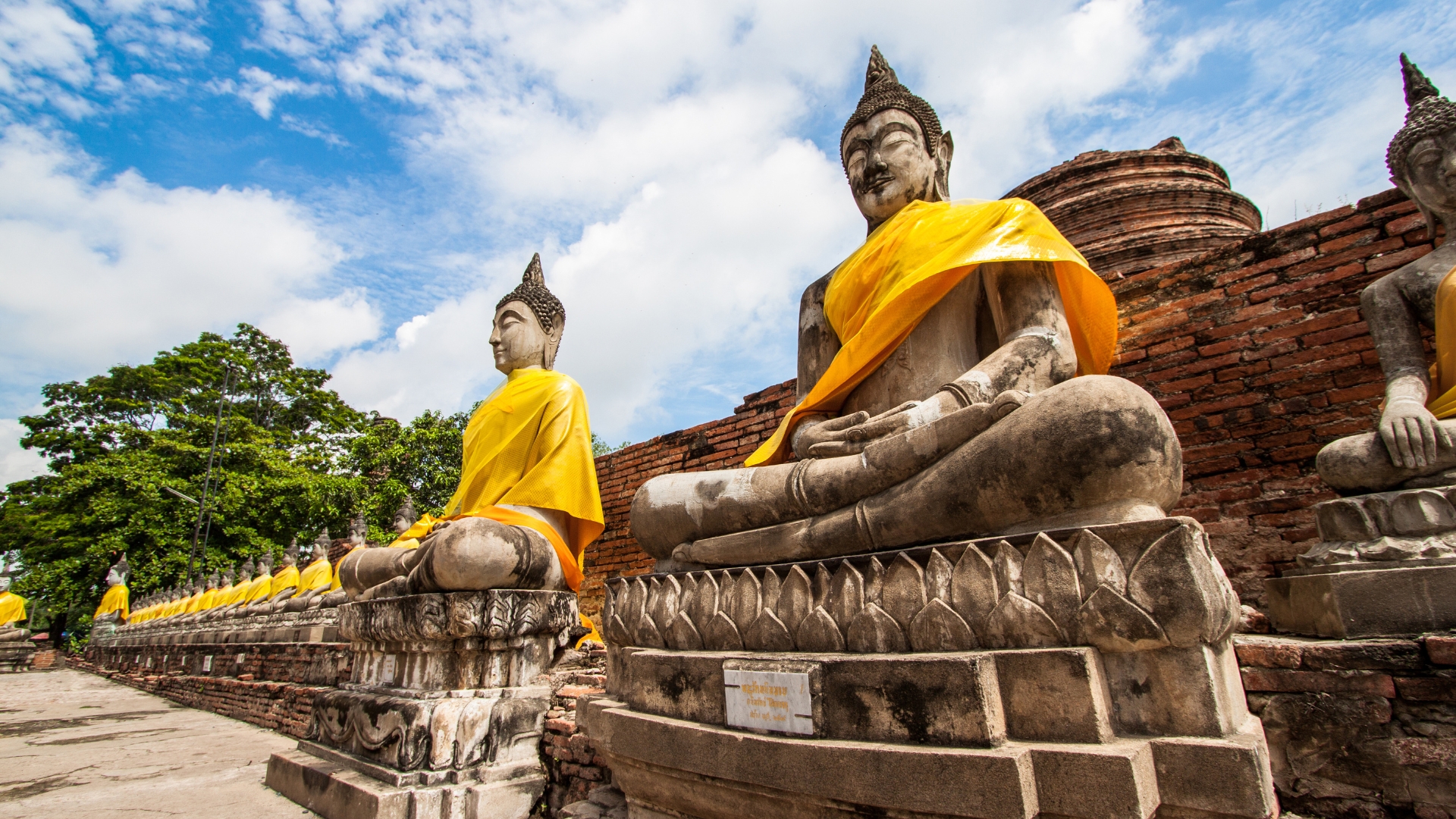
The third day offered a cultural respite from the corporate visits as students traveled to Ayutthaya, the historic former capital of the Kingdom of Siam. This UNESCO World Heritage site provided a rich backdrop for students to explore Thailand’s cultural heritage, with visits to ancient temples and ruins that tell the story of the country’s past. The excursion was not just a break from business-oriented activities but a critical component of understanding the cultural context in which Southeast Asian businesses operate.
During the visit, students were guided through the city’s iconic landmarks, such as Wat Mahathat and Wat Phra Si Sanphet, gaining a deeper appreciation of Thailand’s historical and cultural significance. The day’s activities emphasized the importance of cultural awareness in global business, highlighting how cultural factors can influence business practices and consumer behavior in the region. This cultural immersion broadened the students’ perspectives, equipping them with a nuanced understanding of the social and historical dynamics that shape the Southeast Asian market.
The experience in Ayutthaya also reminded students of the diverse and vibrant cultures that define the ASEAN region. By connecting with Thailand’s rich history, students can see beyond the economic metrics and appreciate the human and cultural dimensions equally important in shaping successful business strategies. The day ended with reflections on the impact of cultural heritage on modern business environments, reinforcing the value of integrating cultural insights into business decision-making.
Day 4: An In-depth Industrial Overview at EssilorLuxottica and Kärcher
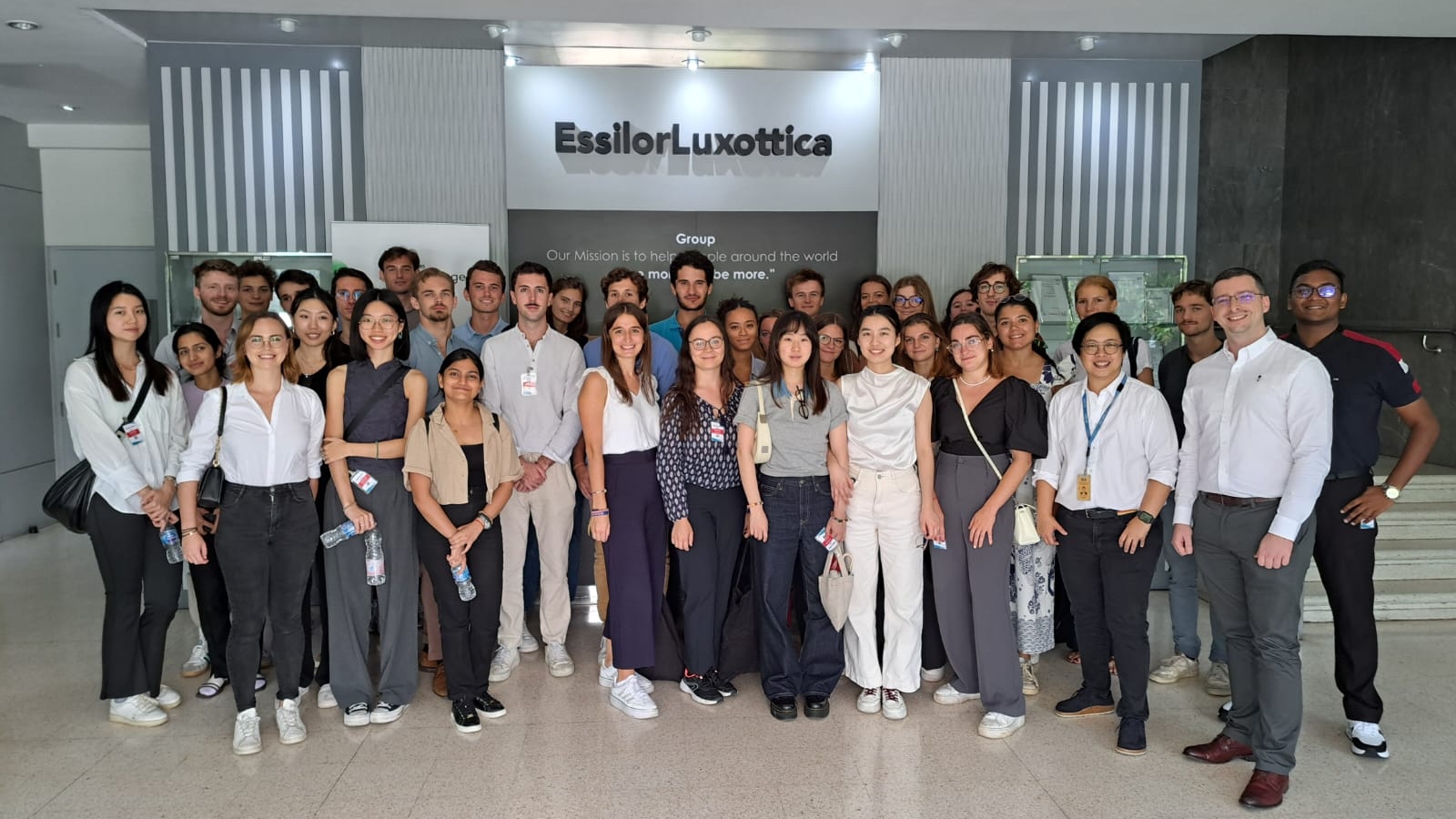
The trip’s fourth day brought students face-to-face with industrial innovation at EssilorLuxottica and Kärcher, two global leaders known for their commitment to quality and continuous improvement. At EssilorLuxottica, students toured the company’s facilities, observing the production of ophthalmic lenses and learning about the latest technological advancements in eye care. The visit highlighted the company’s dedication to improving its vision on a global scale, with a strong emphasis on sustainability and corporate responsibility.
Students then visited Kärcher, where they were introduced to various cleaning technologies, from everyday consumer products to advanced industrial solutions. The company’s focus on innovation was evident as students explored how Kärcher develops cutting-edge technologies to meet diverse customer needs. This visit provided valuable insights into how companies maintain industry leadership through relentless innovation and a commitment to addressing market and environmental challenges.
Conversations with executives at EssilorLuxottica and Kärcher emphasized the importance of integrating sustainable practices and technological innovation in business strategies. Students learned about the challenges these companies face in adapting to rapidly changing market demands while maintaining their core values. The day concluded with a panel discussion on the future of industrial innovation, where students engaged with company leaders on topics such as digital transformation, sustainability, and global expansion.
Day 5: Entrepreneurial Lessons with WYZauto
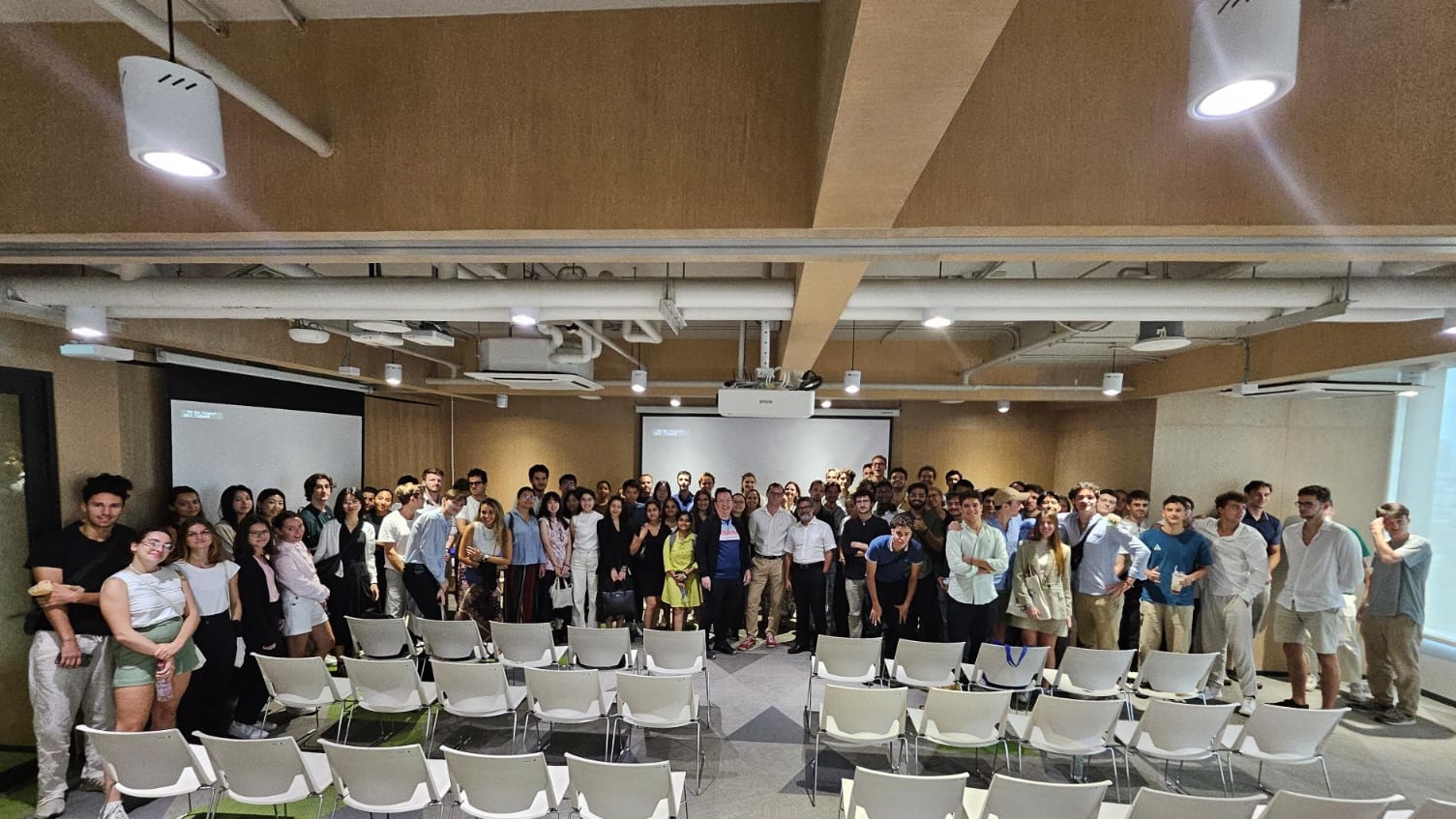
The final day was focused on entrepreneurship and the dynamic opportunities within Southeast Asia’s business landscape. Students visited WYZauto, a thriving marketplace that connects vehicle maintenance shops with premium tire wholesalers. It was founded by an ESSEC alumnus who shared his entrepreneurial journey. From his early career at Michelin to launching his business in Thailand and expanding into Malaysia, the alumnus’s story provided a powerful example of resilience, adaptability, and the pursuit of opportunity.
During the visit, students learned about the challenges of starting a business in a foreign market, including navigating regulatory environments, building local partnerships, and adapting to cultural differences. The alumnus shared insights on the strategic decisions that helped WYZauto grow, such as identifying market gaps and leveraging digital platforms to connect buyers and sellers. This session offered practical lessons on market adaptation and the critical role of strategic thinking in overcoming business hurdles.
The day concluded with an open discussion on the broader entrepreneurial ecosystem in Southeast Asia, where students engaged in dialogue about the region’s potential and the support structures available for new ventures. This final session was an inspiring end to the study trip, leaving students with a deeper understanding of the entrepreneurial mindset and the courage needed to navigate the complexities of starting and scaling a business in Southeast Asia.
A Transformative Experience in Southeast Asia
The Bangkok study trip was a transformative experience for ESSEC MiM students, providing them with unparalleled insights into Southeast Asia’s vibrant and complex business landscape. Throughout the week, students engaged with leading companies across diverse industries, ranging from sustainability and e-commerce to logistics and industrial innovation. These visits not only deepened their understanding of how businesses operate in this rapidly evolving region but also highlighted the unique challenges and opportunities that come with working in Southeast Asia. By witnessing these dynamics first-hand, students were able to connect their academic learning with real-world applications, making the experience both educational and inspiring.
Each day of the trip brought new perspectives and lessons that went beyond traditional classroom education. From exploring the cultural heritage of Ayutthaya to meeting with industry leaders and entrepreneurs, students gained a holistic view of the factors that influence business success in the region. The emphasis on sustainability, innovation, and entrepreneurship throughout the trip underscored the critical skills and mindsets needed to thrive in today’s global economy. This immersive experience also encouraged students to think critically about their own career paths and the impact they wish to make as future business leaders.
Overall, the study trip to Bangkok served as a powerful reminder of the importance of global exposure and cultural awareness in business education. It provided students with practical skills, such as strategic thinking and adaptability, which are essential in navigating complex and dynamic markets. Moreover, the opportunity to engage directly with professionals and peers in a real-world setting helped students build valuable networks and fostered a deeper appreciation for the diversity and interconnectedness of the global business environment. As they return to their studies at ESSEC, the insights and experiences gained from this trip will undoubtedly continue to shape their academic and professional journeys, equipping them with the tools to excel in their future careers.
RELATED POSTS
Building a Personal Brand While You Study
How students use LinkedIn, blogging, or speaking engagements to stand out.
Finding Your Fit: How ESSEC Asia-Pacific Career Services Help Global BBA Students Build Meaningful Career Paths
As Manager of Career Services at ESSEC Asia-Pacific, Cerella Sim draws on over a decade of recruitment experience to help Global BBA students…
Success After Graduation: Alumni Job Outcomes in Asia
ESSEC Asia-Pacific's Global Bachelor of Business Administration (GBBA) program effectively prepares students for successful, globally-focused…
What I Learned from Failing My First Job Application
First rejection taught ESSEC alumna Medha Thakkar that career setbacks spark growth, leading to resilience, networks, and unexpected opportunities.
Career Success Through the ESSEC Global BBA
ESSEC's Global BBA transforms students through immersive professional experiences, international mobility, and real-world learning opportunities…
The Asian Etiquette Guide for ESSEC Asia-Pacific Students
Asian business etiquette translates cultural awareness into competitive advantage through respectful greetings, proper hierarchy navigation, and…
